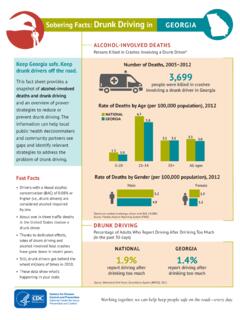Transcription of Hepatitis B - Basic Information
1 Hepatitis BGeneral InformationWhat is Hepatitis ? Hepatitis means inflammation of the liver. The liver is a vital organ that processes nutrients, filters the blood, and fights infections. When the liver is inflamed or damaged, its function can be affected. Heavy alcohol use, toxins, some medications, and certain medical conditions can cause Hepatitis . However, Hepatitis is most often caused by a virus. In the United States, the most common types of viral Hepatitis are Hepatitis A, Hepatitis B, and Hepatitis C.
2 The only way to know if you have Hepatitis B is to get tested. What is Hepatitis B? Hepatitis B can be a serious liver disease that results from infection with the Hepatitis B virus. Acute Hepatitis B refers to a short-term infection that occurs within the first 6 months after someone is infected with the virus. The infection can range in severity from a mild illness with few or no symptoms to a serious condition requiring hospitalization. Some people, especially adults, are able to clear, or get rid of, the virus without treatment.
3 People who clear the virus become immune and cannot get infected with the Hepatitis B virus again. Chronic Hepatitis B refers to a lifelong infection with the Hepatitis B virus. The likelihood that a person develops a chronic infection depends on the age at which someone becomes infected. Up to 90% of infants infected with the Hepatitis B virus will develop a chronic infection. In contrast, about 5% of adults will develop chronic Hepatitis B. Over time, chronic Hepatitis B can cause serious health problems, including liver damage, cirrhosis, liver cancer, and even death.
4 How is Hepatitis B spread?The Hepatitis B virus is spread when blood, semen, or other body fluids from an infected person enters the body of someone who is not infected. The virus can be spread through: Sex with an infected person. Among adults, Hepatitis B is often spread through sexual contact. Injection drug use. Sharing needles, syringes, and any other equipment to inject drugs with someone infected with Hepatitis B can spread the virus. Outbreaks. While uncommon, poor infection control has resulted in outbreaks of Hepatitis B in healthcare settings.
5 Birth. Hepatitis B can be passed from an infected mother to her baby at birth. Worldwide, most people with Hepatitis B were infected with the virus as an infant. Hepatitis B is not spread through breastfeeding, sharing eating utensils, hugging, kissing, holding hands, coughing, or sneezing. Unlike some forms of Hepatitis , Hepatitis B is also not spread by contaminated food or water. What are the symptoms of Hepatitis B? Many people with Hepatitis B do not have symptoms and do not know they are infected.
6 If symptoms occur, they can include: fever, feeling tired, not wanting to eat, upset stomach, throwing up, dark urine, grey-colored stool, joint pain, and yellow skin and eyes. When do symptoms occur? If symptoms occur with an acute infection, they usually appear within 3 months of exposure and can last up to 6 months. If symptoms occur with chronic Hepatitis B, they can take years to develop and can be a sign of advanced liver on next pageHow would you know if you have Hepatitis B? The only way to know if you have Hepatitis B is to get tested.
7 Blood tests can determine if a person has been infected and cleared the virus, is currently infected, or has never been should get tested for Hepatitis B and why? CDC develops recommendations for testing based upon a variety of different factors. Here is a list of people who should get tested. The results will help determine the next best steps for vaccination or medical care. All pregnant women are routinely tested for Hepatitis B. If a woman has Hepatitis B, timely vaccination can help prevent the spread of the virus to her baby.
8 Household and sexual contacts of people with Hepatitis B are at risk for getting Hepatitis B. Those who have never had Hepatitis B can benefit from born in certain parts of the world that have increased rates of Hepatitis B. Testing helps identify those who are infected so that they can receive timely medical care. People with certain medical conditions should be tested, and get vaccinated if needed. This includes people with HIV infection, people who receive chemotherapy and people on hemodialysis.
9 People who inject drugs are at increased risk for Hepatitis B but testing can tell if someone is infected or could benefit from vaccination to prevent getting infected with the virus. Men who have sex with men have higher rates of Hepatitis B. Testing can identify unknown infections or let a person know that they can benefit from is Hepatitis B treated? For those with acute Hepatitis B, doctors usually recommend rest, adequate nutrition, fluids, and close medical monitoring. Some people may need to be hospitalized.
10 People living with chronic Hepatitis B should be evaluated for liver problems and monitored on a regular basis. Treatments are available that can slow down or prevent the effects of liver Hepatitis B be prevented?Yes. The best way to prevent Hepatitis B is by getting vaccinated. The Hepatitis B vaccine is typically given as a series of 3 shots over a period of 6 months. The entire series is needed for long-term protection. Who should get vaccinated against Hepatitis B?All infants are routinely vaccinated for Hepatitis B at birth, which has led to dramatic declines of new Hepatitis B cases in the US and many parts of the world.
















